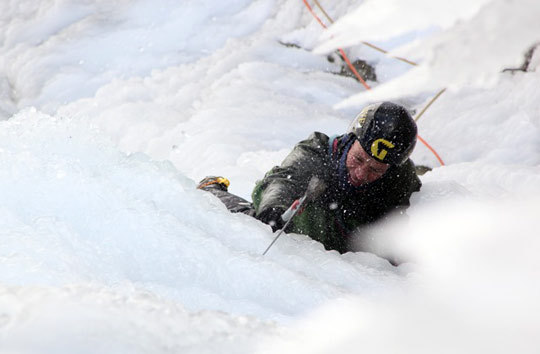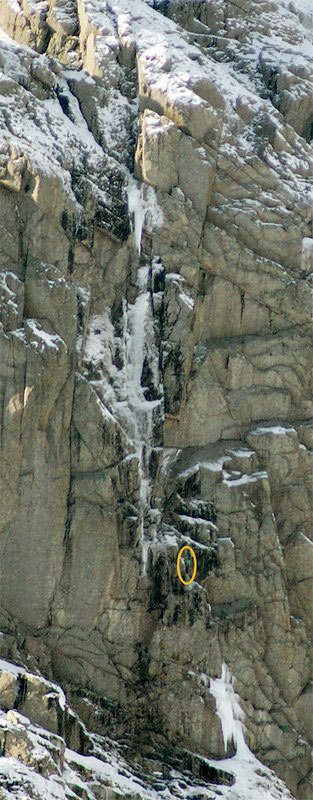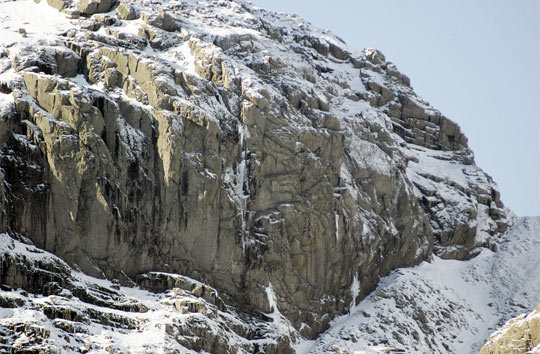
Dave Birkett swings his way up the first ascent of Never Ever Say Never (VIII 8 or E7 5c) on his home crag, the East Buttress of Scafell Pike, Lake District, England. Birkett and partners climbed the winter route over two days, January 30-31, the first time the line had significant ice in 28 years. [Photo] Ed Luke

Climbers barely visible on Never Ever Say Never. [Photo] Al Phizacklea
Over two days in late January, Dave Birkett climbed the first ascent of a fabled winter route on his home crag, the East Buttress of Scafell Pike in England’s Lake District.
Never Ever Say Never (VIII 8 or E7 5c) follows a mercurial strip of ice that runs the length of the crag and links three rock routes: Gold Rush (E1), Yellow Slab (HVS) and Overhanging Grooves (E3). Part of the line’s appeal is that it rarely forms. Climber Al Phizacklea spotted ice there in 1982; he said that this January marked the first time since then–28 years–that the ice was in.
And Birkett wasn’t even looking for it. When he and his wife, Mary Jenner, arrived the first sunny morning, January 30, Birkett was wandering around the crag when he spotted ice running from the top of Overhanging Grooves to the base of Gold Rush. “I’d heard of this icefall before,” he said, “but it felt more like climbing folklore than reality.” Despite warm weather, they decided to give it a try.
Low on Gold Rush, a sizeable pillar of ice offered good protection; higher up offered steep drytooling. Typical of the East Buttress, many of the rock routes follow weaknesses between corners and grooves, but Birkett and Jenner were forced to climb the vertical line of ice that coated the steep wall. With the warm weather creating sketchy conditions and falling ice, they took shelter in a corner as they continued up Yellow Slab.
From this belay, Birkett worked up Yellow Slab with balancy, delicate moves and questionable hooks on verglassed rock. Protection was scarce, and a fall would have sent him back down on Jenner. Eventually, they arrived at the base of the Overhanging Grooves, but due to dangerous conditions and a lack of headlamps, they descended with resolution to come back the next day.
On Sunday, Jenner was out, and Andy Mitchell was in. The pair left early, knowing a huge hanging icicle loomed near the top of the crag, and rappelled into the previous day’s highpoint. Birkett climbed the first two pitches of Overhanging Grooves on extremely thin and poorly protected ice. Exhausted and frayed, Birkett sent Mitchell up the last pitch and joined him on top.
Birkett classified Never Ever Say Never as one of his most intense mental and physical climbing experiences. “The line was very important to him,” photographer Ed Luke said. “You could see that through the lens 100 feet above. There are certain firsts climbers need and Dave definitely wasn’t going to let this one slip away.”
Phizacklea, who spotted the line nearly three decades ago, was also there to photograph on Sunday. “The way [Dave] was babbling in an almost incoherent manner on Sunday night–he’d only just got home–showed just how much climbing on his own Scafell meant to him.”

The East Buttress of Scafell Pike. Never Ever Say Never takes the obvious ice streak in the center of the wall. [Photo] Al Phizacklea